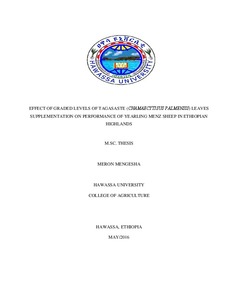Effect of graded levels of Tagasaste (Chamaecytisus palmensis) leaves supplementation on performance of yearling Menz sheep in Ethiopian Highlands
Abstract
The effects of supplementation with graded levels of tagasaste (Chamaecytisus palmensis) leaves on feed intake, digestibility, and body weight gain (BWG) and carcass characteristics were studied using thirty yearling and intact male Menz sheep. The sheep were blocked into six blocks of five sheep based on their initial body weight and animals from each block were randomly assigned to five treatment groups with six replications per treatment in randomized complete block design (RBCD). Barley straw was fed ad libitum as a sole diet in treatment 1 (T1) and as a basal diet supplemented with 100, 200, 300 and 400g dried tagasaste leaf in the other treatments i.e. T2, T3, T4 and T5, respectively. A 90- day growth experiment and 7- day digestibility trial were conducted. Dry matter (DM), organic matter (OM), and crude protein (CP) intakes increased (P<0.05) with increasing levels of tagasaste leaf in the diets. Sheep fed T1, T2, T3, T4, and T5 diets gained (P<0.05) -5.5, 19.2, 40.7, 61.8 and 71.8 g/head/ day, respectively. The apparent digestibility of DM, OM, CP, neutral detergent fiber and acid detergent fiber significantly increased (P<0.05) with increasing levels of tagasaste leaf supplementation. The hot carcass weight showed a significant increase from T1 (6.9 kg) to T5 (11 kg) with increasing level of supplementation. Dressing percentage on slaughter weight basis and empty body weight basis did not differ (P>0.05) among treatments, but dressing percentage on empty body weight basis have higher than on slaughter weight basis this imply that the influence of digesta. Supplementing a basal diet of barley straw with tagasaste leaves improved DM intake, BWG, digestibility of nutrients and carcass. It is concluded that 400g/d/head of tagasaste leaf can serve as a protein supplement to low quality feed during dry season for efficient performance of sheep.

